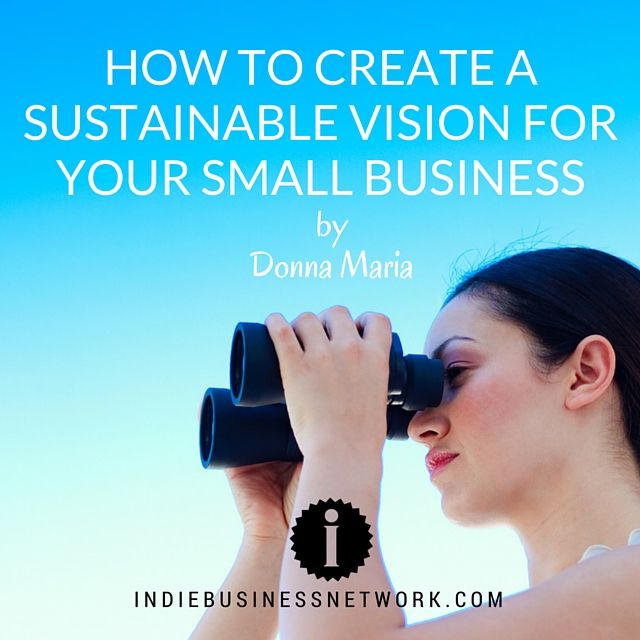I‘m very fortunate. I had a vision for my business from the moment it started. Over the years, I have taken it for granted that everyone else did too. I have learned that this is not true. If you don't have a sustainable vision for your business, you will after you take the steps outlined in this post.

Proverbs 29:18, an oft-quoted Bible verse, says: “Where there is no vision, the people perish.” Adapting this to entrepreneurship, when you don't have a vision for your business, your business will perish.
What Does a Business Without a Vision Look Like?
One of the symptoms of a business without a vision is a business leader who is constantly taking classes and learning how to do this and that, but not really pushing the ball forward. Taking blogging classes. Hiring consultants for strategy sessions. Joining every group on Planet Facebook. Learning how to market and sell. Learning how to insert anything here. You get the picture.
This is an easy trap to fall into because everything being learned is wonderful and important and necessary. If you have a business, of course you should learn how to blog ad use Facebook and market and sell. The problem comes when you are continually trying to layer important strategies on top of a business with no vision. This results in a gap between the work that needs to get done and the vision or outcome toward which the work is directed.
If there is no vision, you will enjoy the satisfaction of learning, of course. But it's like loading a brand new app onto a smart phone that's 10 years old. There may be results in the short term, but they won't be sustainable over time. The app is wasted on a phone that cannot handle the complexity of the more modern app.
In order to achieve sustainable business results, you first need a sustainable business vision.
”
Donna Maria Coles Johnson, Indie Business Network
If you see yourself in the first part of this post, it's OK. All is not lost. You can create a sustainable vision for your business. If you're intentional, creating that vision does not have to be hard and it does not have to take a ton of time. It's never too late, no matter how long you've been in business, to create a vision — or revamp an existing vision — for your business. Here are five steps to help you do that.
How to Create a Sustainable Vision for Your Small Business
- Why your business? Why?
Why do you even have business in the first place? What is the point? Close your eyes and consider how the world will be different because your business exists. What does your business to stand for? What will be its legacy?
For example, Jack Canfield of the Chicken Soup for the Soul publishing franchise, told me that he and his co-founder's vision is to sell a billion books by the year 2020.
Amazon founder Jeff Bezos has been quoted as saying that his vision for Amazon is to be “the place where customers can come to buy anything they want to buy online.”
My vision is to ensure that every woman knows that she can support herself and her children by selling things she makes.
If you've been in business for even a short time, chances are good that you already have some of your vision in place. Do you notice any themes or patterns? Does regular customer feedback help you paint a mental picture of the impact you want your business to have over time? Start with that, and then move through the next steps.
- Make it personal.
Your vision for your business should somehow intersect with your own personal vision for your life. Have your experiences taught you to take better care of yourself, and your products encourage women to do this? Has a traumatic event in your life caused you to create a way to help other people avoid a particular painful experience? Or maybe an especially positive experience has caused you to want to create a way to help others enjoy a similar joyful experience?
There are examples all around you, including former high school teacher, Melissa Camilleri of Compliment, who married her teaching profession with her vision of a world with more educated young girls from non-wealthy backgrounds, to create a business that helps female high school students further their academic studies.
The more personal your vision, the more likely it is to serve as the sustainable foundation of your business for decades to come.
- Make it clear.
Lack of clarity will destroy the best laid plans and the most noble vision. Make your vision clear. Don't worry so much about how you are going to make the vision a reality. Just be clear about what the vision is.
For example, I have read that Zappos founder Tony Hsieh's vision for the company is to provide the best customer service in the world. It doesn't really matter what he sells or how many customer service reps he has to hire in order to do that. Those are the details. The vision is the clear, big picture.
Your vision sets you apart from everyone else executing strategic plans that are similar to yours. Your vision is something your target customer (and even the whole world) can get behind. It's that clear. It's that personal. It's that inspiring. Which brings me to …
- Make it inspiring.
A vision should make people stand up and take notice. It should cause them to actually get behind you as you make the world a better place with your business. It should make them cheer you on as you sell a billion self-help books by 2020, or create a world where more girls can make their academic dreams a reality. Who can't get behind those visions?
Your vision should touch some kind of an emotional need in everyone who hears it.
- Make it simple.
Make your vision statement as short as possible to reflect the overall mental picture. Too many words make people's eyes glaze over, and they don't retain any of what they are hearing. A short vision statement is easy for people to remember and repeat over and over again, making it easy for them to tell their friends.
The vision statements referenced above are short and memorable. There are no fancy words or catch phrases. Even a young child can understand and choose to embrace the concepts in an effective vision statement. Make yours one of them.
It sounds simple, and it is. Your vision statement is your North Star. If serves as the foundation for everything you do in your business. When you want to quit, remembering your vision keeps you going.
When you are learning difficult marketing and sales concepts, you will still have to work insanely hard to achieve specific business goals, but you have a framework for your journey. This framework makes it easier to choose and implement the strategies you need to be successful. Your vision provides the fuel that helps you organize your thoughts so your actions can be effective and specifically aimed at magnifying your vision.
Question
What is the vision for your business? Is it simple, clear, and precise? Is it something we can understand and cheer? I invite you to share your thoughts and feedback in the comments below, and share your vision too! And if this post is helpful you, please do share on Facebook, Twitter and LinkedIn.



